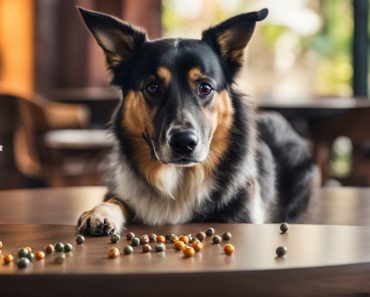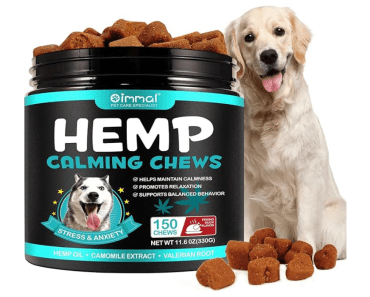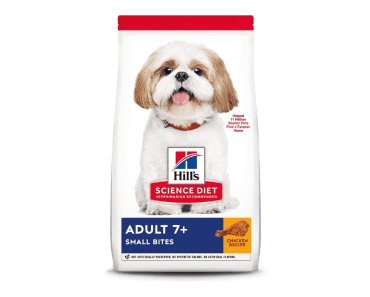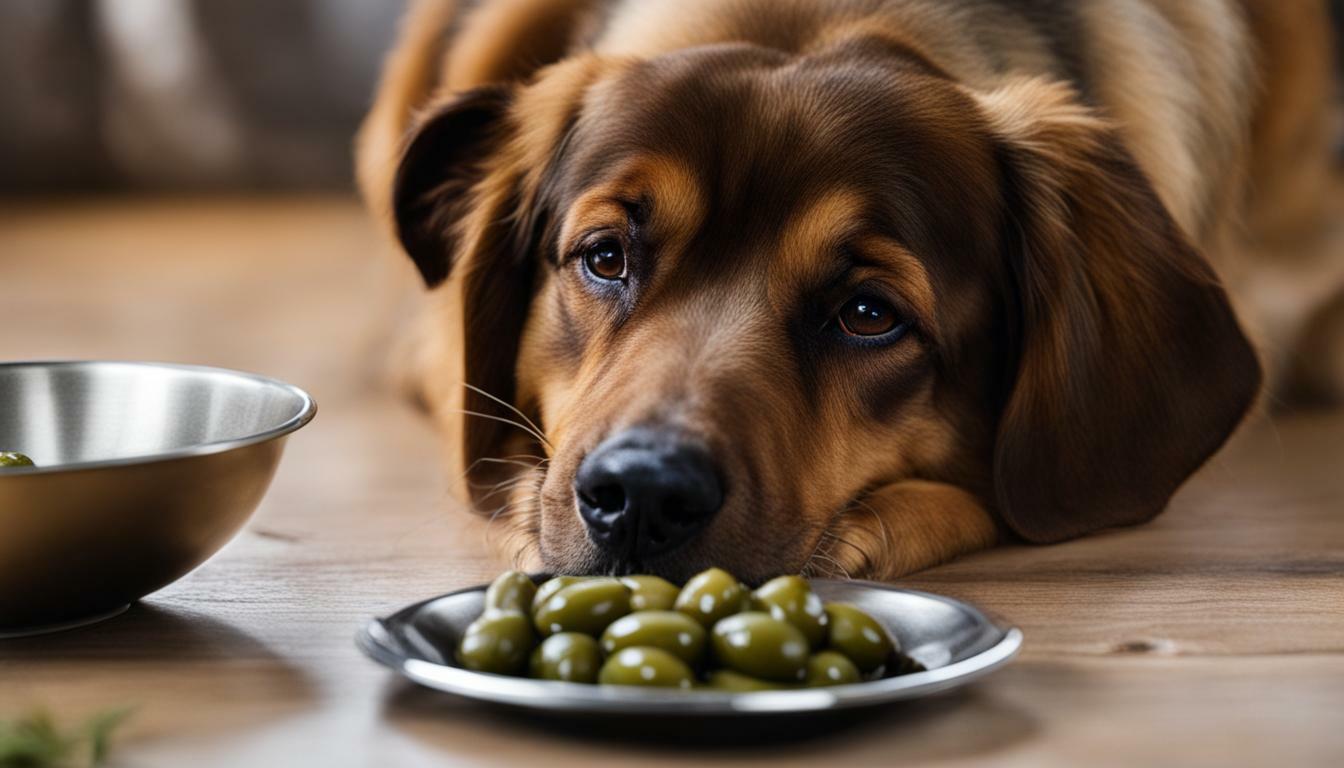
If you’ve ever wondered, “can dogs eat olives?” you’re in the right place. Let’s dive into this comprehensive guide and find out!
Key Takeaways:
- Olives are not toxic to dogs, but should be fed in moderation.
- Avoid olives packed with salt and fat, as they can cause digestive issues.
- Give dogs plain olives without pits and added ingredients like garlic, onions, alcohol, or blue cheese.
- Black olives and green olives are safe for dogs, but should be given in small amounts due to their high sodium content.
- Olive oil can be a healthy addition to a dog’s diet in small amounts, but excess consumption can lead to pancreatitis.
When introducing new foods to your dog’s diet, it is important to do so in moderation and consult with your veterinarian if you are unsure about their safety. Remember, every dog is different, and what may be safe for one dog may not be for another.
If your dog eats an olive and appears sick, it is recommended to contact your veterinarian for guidance. They will be able to assess the situation and provide appropriate advice.
Now that you have the information you need, you can make an informed decision about including olives in your furry friend’s diet. Remember, a balanced and varied diet is key to your dog’s overall health and well-being.
The Benefits of Olives for Dogs
Olives can offer some potential benefits for dogs and can be a tasty treat to add variety to their diet. While olives are not an essential part of a dog’s nutrition, they can provide certain nutrients that contribute to their overall health. Here are some of the benefits that olives can offer to our furry friends:
- Rich in antioxidants: Olives are packed with antioxidants, which help to neutralize harmful free radicals in a dog’s body. These antioxidants can support a healthy immune system and reduce the risk of certain diseases.
- Good source of healthy fats: Olives contain monounsaturated fats, which are considered healthy fats. These fats can contribute to a dog’s skin and coat health, helping to keep their fur shiny and their skin moisturized.
- Provides vitamin E: Olives are a natural source of vitamin E, which is an essential nutrient for dogs. Vitamin E helps to protect cells from damage, supports a healthy immune system, and promotes overall well-being.
- Offers a satisfying crunch: Many dogs enjoy the texture and crunchiness of olives. Incorporating olives into their diet can provide them with a satisfying chewing experience, helping to keep their teeth and gums clean and healthy.
It’s important to note that while olives can be beneficial for dogs, they should be given in moderation. Too much salt or fat from olives can lead to digestive issues such as gas, diarrhea, and vomiting. Additionally, olives should be plain and free from pits and any added ingredients like garlic, onions, alcohol, or blue cheese, which can be harmful to dogs.
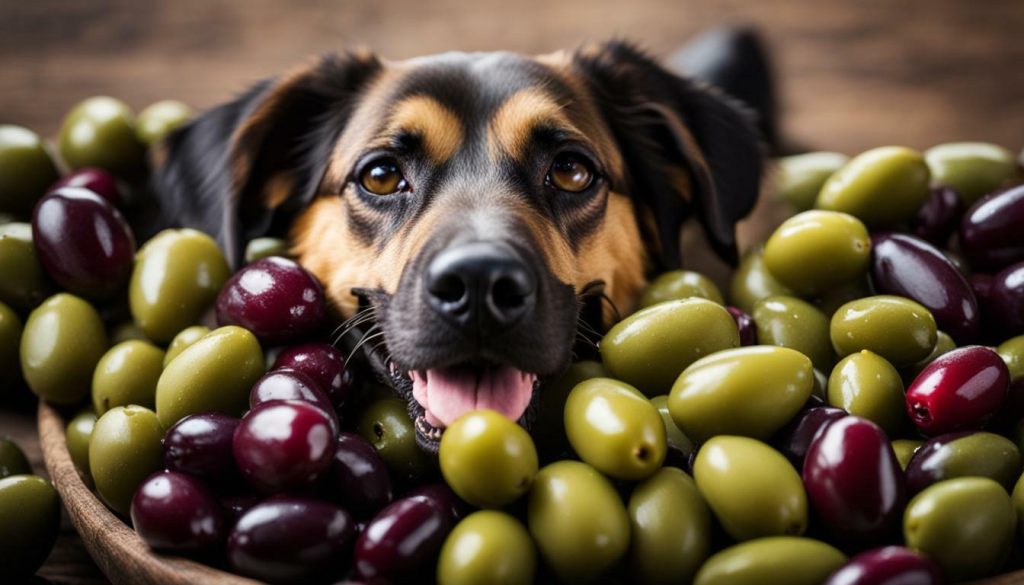
Potential Risks of Dogs Eating Olives
While olives can be safe for dogs to eat in moderation, there are potential risks and digestive concerns that should be considered. Olives packed with salt and fat can lead to digestive issues in dogs, such as gas, diarrhea, and vomiting. This is especially true if your dog consumes a large quantity or if they have a sensitive stomach. It is important to give dogs plain olives without pits and without added ingredients like garlic, onions, alcohol, or blue cheese. These ingredients can be toxic to dogs and may cause harmful effects on their health.
Another factor to consider is the high sodium content in olives. Both black olives and green olives are safe for dogs, but they should be given in small amounts due to their sodium levels. Excessive sodium intake can lead to dehydration and other health problems in dogs. It is best to offer olives as an occasional treat rather than a regular part of their diet.
Olive oil, while generally safe for dogs, should also be used in moderation. It can be a healthy addition to their diet, providing essential fatty acids and antioxidants. However, if consumed in excess, olive oil can contribute to pancreatitis, a potentially serious condition that affects the pancreas.
Signs of Olive-related Digestive Issues
If your dog consumes olives and displays signs of illness, it is important to contact a veterinarian. Common symptoms of digestive issues associated with olives include:
- Gas
- Diarrhea
- Vomiting
- Abdominal discomfort
Remember, introducing new foods to your dog’s diet should always be done in moderation, and it is important to consult with your veterinarian if you are unsure about what foods are safe for your furry companion. Their expertise will help you make informed decisions and ensure your dog’s well-being.
| Olives | Safety for Dogs |
|---|---|
| Plain Olives without pits | Safe in moderation |
| Olives with added ingredients like garlic, onions, alcohol, or blue cheese | Avoid – potentially toxic to dogs |
| Black Olives and Green Olives | Safe in small amounts |
| Olive Oil | Safe in small amounts, excessive intake can cause pancreatitis |
| Stuffed Olives | Avoid – may contain harmful ingredients |
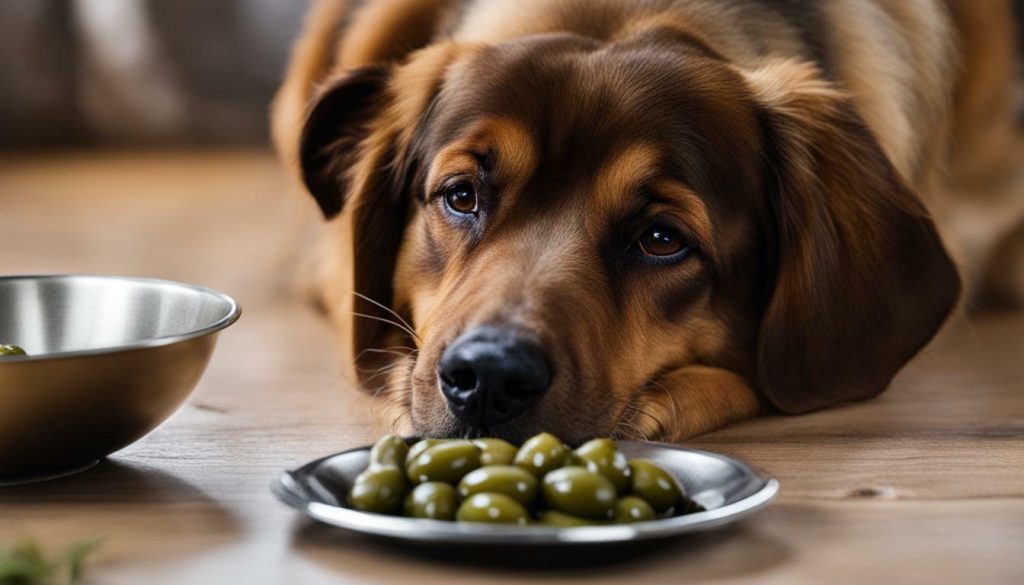
The Importance of Moderation
As with any new food in a dog’s diet, it’s essential to introduce olives gradually and in moderation to avoid any potential adverse effects. While olives are not toxic to dogs, they should be given sparingly due to their high salt and fat content. Feeding olives packed with salt and fat can lead to digestive issues in dogs, such as gas, diarrhea, and vomiting.
When offering olives to your furry friend, it’s important to choose plain olives without pits and without added ingredients like garlic, onions, alcohol, or blue cheese. These ingredients can be harmful to dogs and should be avoided. When it comes to the different types of olives, both black olives and green olives are safe for dogs, but they should be given in small amounts. These olives are high in sodium, so it’s crucial to limit their intake to prevent excessive sodium consumption.
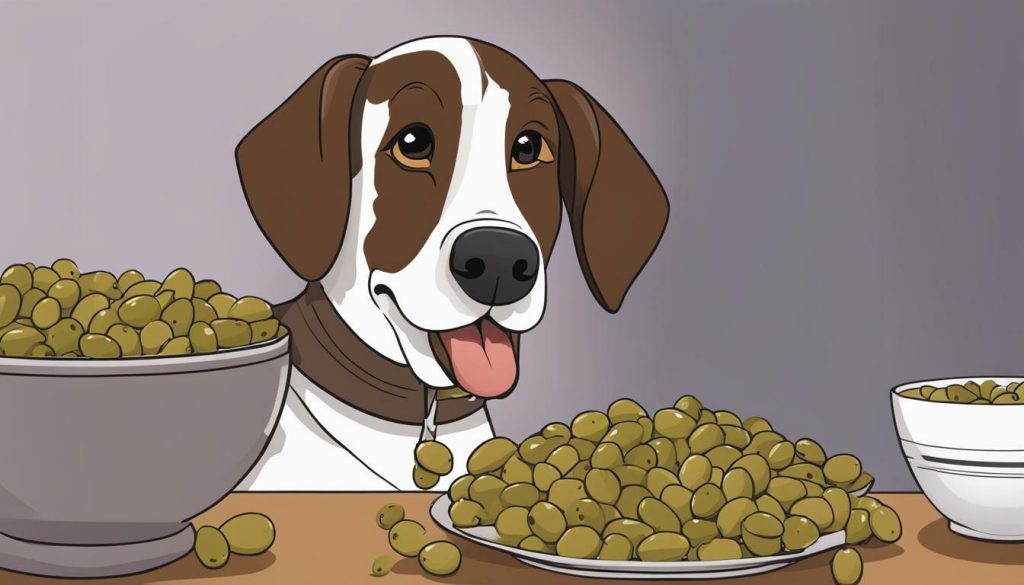
Olive oil can also be a healthy addition to a dog’s diet, but it should be used sparingly. Small amounts of olive oil can provide certain health benefits for dogs, such as improved coat and skin condition, and enhanced digestion. However, excessive consumption of olive oil can lead to pancreatitis, a serious condition in dogs. Therefore, it’s important to consult with a veterinarian before incorporating olive oil into your dog’s diet.
It’s worth mentioning that stuffed olives should be avoided when it comes to feeding dogs. These olives commonly contain ingredients like garlic or blue cheese, which can be harmful to dogs. If your dog accidentally consumes an olive and appears sick, it’s recommended to contact a veterinarian for guidance and advice.
| Key Takeaways: |
|---|
| Introduce olives gradually and in moderation to avoid digestive issues in dogs. |
| Choose plain olives without pits and without added harmful ingredients. |
| Both black olives and green olives are safe for dogs, but should be given in small amounts due to their high sodium content. |
| Use olive oil sparingly and consult a veterinarian before incorporating it into your dog’s diet. |
| Avoid stuffed olives, as they may contain harmful ingredients. |
The Different Types of Olives and Their Safety for Dogs
Both black olives and green olives are generally safe for dogs to consume, but there are certain considerations to keep in mind. While olives can be a tasty treat for your furry friend, it is important to remember that they should only be given in moderation. Too many olives can lead to digestive issues such as gas, diarrhea, and vomiting.

When feeding olives to your dog, it is crucial to choose plain olives without pits and without any added ingredients like garlic, onions, alcohol, or blue cheese. These additional ingredients can be harmful to dogs and should be avoided at all costs. Always check the label before giving olives to your dog to ensure they are free from any potentially harmful additives.
Although olives may be safe for dogs, it is important to note that they are high in sodium. Too much sodium can be detrimental to your dog’s health, so it is best to offer olives as an occasional treat rather than as a regular part of their diet. As with any new food, it’s always a good idea to start with small amounts and monitor your dog for any adverse reactions.
In Summary:
- Both black olives and green olives are generally safe for dogs, but should be fed in moderation.
- Avoid olives with pits and those that contain garlic, onions, alcohol, or blue cheese.
- Olives should be given as an occasional treat due to their high sodium content.
- Start with small amounts and watch for any digestive issues or allergies.
- If your dog shows any signs of illness after consuming olives, it is best to consult with a veterinarian.
| Types of Olives | Considerations |
|---|---|
| Black Olives | Safe for dogs, but high in sodium. Feed in moderation. |
| Green Olives | Safe for dogs, but high in sodium. Feed in moderation. |
Olives and Canine Nutrition
Olives offer some nutritional value and can be incorporated into a well-balanced diet for dogs. However, it is important to note that olives should be given in moderation and certain precautions should be taken to ensure the safety of your furry friend.
When it comes to nutritional content, olives are a good source of healthy fats and vitamin E. These fats can help support a dog’s skin and coat health, while vitamin E acts as a powerful antioxidant that helps protect the cells from damage. Additionally, olives contain fiber, which can aid in digestion and promote a healthy digestive system for your dog.
While olives can provide these benefits, it is essential to be mindful of the type and amount you feed your dog. Black olives and green olives are safe for dogs, but they tend to be high in sodium. Therefore, it is recommended to give them in small amounts to avoid potential health issues associated with excessive sodium intake.
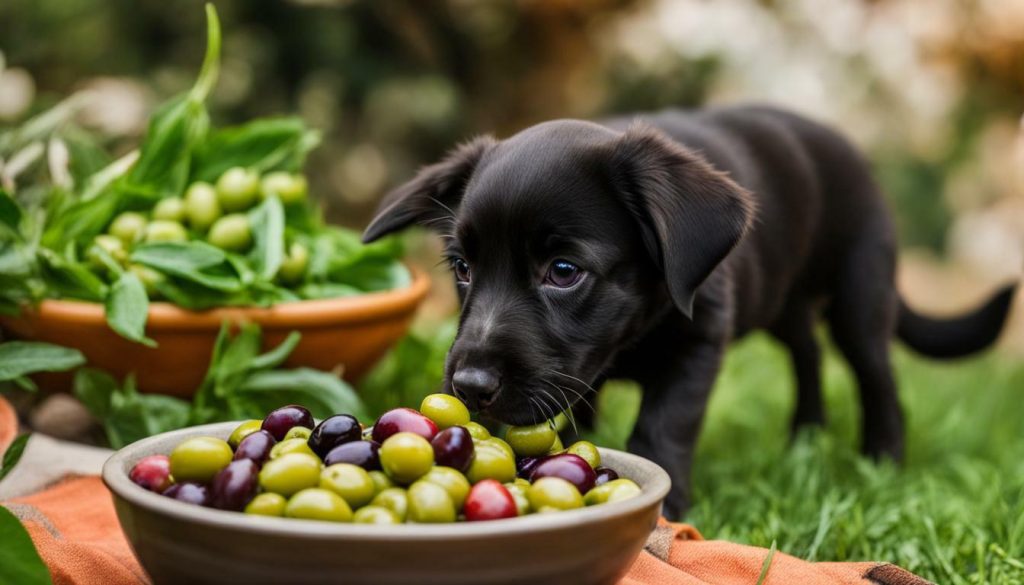
If you decide to include olives in your dog’s diet, it is important to choose plain olives without pits and without added ingredients like garlic, onions, alcohol, or blue cheese. These ingredients can be harmful to dogs and should be avoided. Additionally, stuffed olives should be off-limits for your furry companion, as they may contain ingredients that can be toxic or difficult for dogs to digest.
As with any new food, it is crucial to introduce olives gradually into your dog’s diet and monitor their reaction. If your dog eats an olive and shows signs of illness, such as vomiting or diarrhea, it is best to consult with your veterinarian. They will be able to provide guidance and ensure the health and well-being of your beloved pet.
| Nutrient | Amount per 100g of Olives |
|---|---|
| Calories | 145 |
| Protein | 1.03g |
| Fat | 15.32g |
| Carbohydrates | 3.84g |
| Fiber | 3.3g |
| Sodium | 735mg |
| Potassium | 88mg |
| Vitamin E | 1.65mg |
Olive Oil and Dogs
Olive oil can be a healthy addition to a dog’s diet when given in small amounts, but it’s important to be cautious about the quantity and frequency. Rich in monounsaturated fats and antioxidants, olive oil can provide various benefits to our canine companions.
When incorporated into a balanced diet, olive oil can promote a healthy coat and skin, support a strong immune system, and aid in digestion. Its anti-inflammatory properties can also benefit dogs with arthritis or other inflammatory conditions. Additionally, olive oil can contribute to brain health and help prevent cognitive decline in senior dogs.
When feeding olive oil to your dog, start with small doses and gradually increase the amount over time. A general guideline is to give 1 teaspoon of olive oil per 20 pounds of body weight, up to a maximum of 1 tablespoon for larger dogs. However, it’s essential to consult with your veterinarian to determine the appropriate dosage for your specific dog.
Remember, moderation is key. Too much olive oil can lead to weight gain, gastrointestinal upset, or even pancreatitis, a serious condition that requires immediate veterinary care. Always monitor your dog’s response to olive oil and adjust the amount accordingly.
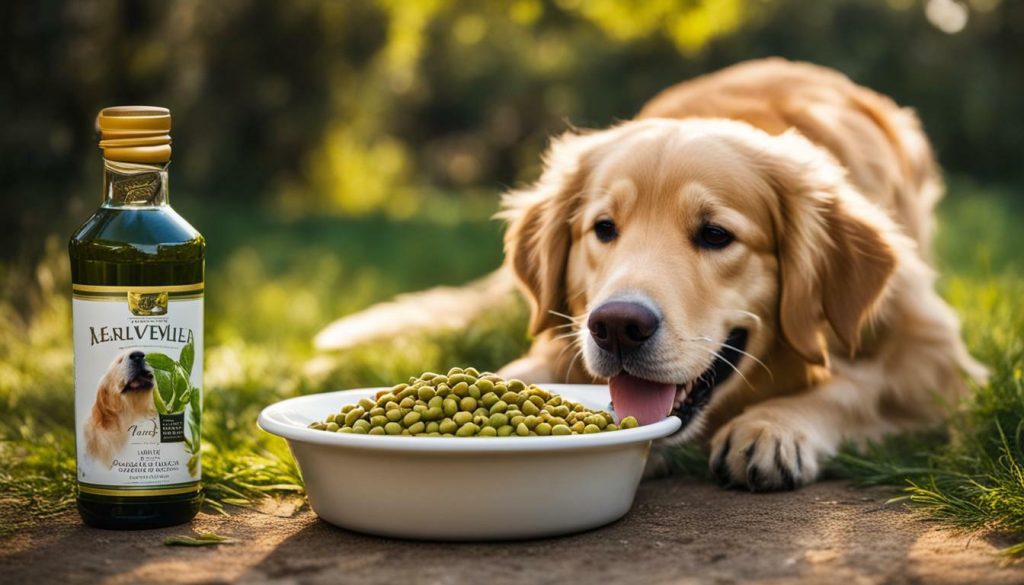
| Type of Olive Oil | Recommended Amount |
|---|---|
| Extra Virgin Olive Oil | 1 teaspoon per 20 pounds of body weight |
| Regular Olive Oil | 1 tablespoon per 20 pounds of body weight (max) |
Always choose high-quality, extra virgin olive oil and avoid any oils that are flavored or infused with garlic or onions, as these can be toxic to dogs. Additionally, opt for organic olive oil whenever possible to minimize exposure to pesticides or other harmful substances.
As with any new food introduced to your dog’s diet, it’s crucial to observe their response. If you notice any adverse reactions, such as diarrhea, vomiting, or lethargy, discontinue the use of olive oil and consult your veterinarian.
Avoiding Harmful Ingredients and Stuffed Olives
When feeding olives to dogs, it’s crucial to ensure that they are plain, without any added ingredients that may be harmful to their health. Dogs have different nutritional needs than humans, and some ingredients that are safe for us can be toxic to them. As a responsible pet parent, always read the labels carefully and avoid olives that contain garlic, onions, alcohol, or blue cheese. These ingredients can cause various health issues in dogs, ranging from digestive problems to organ damage.
Stuffed olives, although they may be tempting to share with your furry friend, should also be avoided. They often come filled with ingredients that are not suitable for dogs, such as garlic or blue cheese. While these ingredients may be harmless or even beneficial to humans, they can be toxic or cause allergic reactions in dogs. It’s best to stick to plain olives without any added fillings or seasonings.
To help you make informed decisions, consult the table below for a summary of safe and harmful ingredients when it comes to feeding olives to dogs:
| Safe Ingredients | Harmful Ingredients |
|---|---|
| Plain olives (without pits) | Garlic |
| Onions | |
| Alcohol | |
| Blue cheese |
Remember, it’s always a good idea to consult with your veterinarian before introducing any new foods into your dog’s diet. They can provide specific guidance based on your dog’s individual needs and health conditions. By being mindful of ingredient lists and feeding olives in moderation, you can ensure that your furry friend can safely enjoy this delicious treat without any adverse effects.
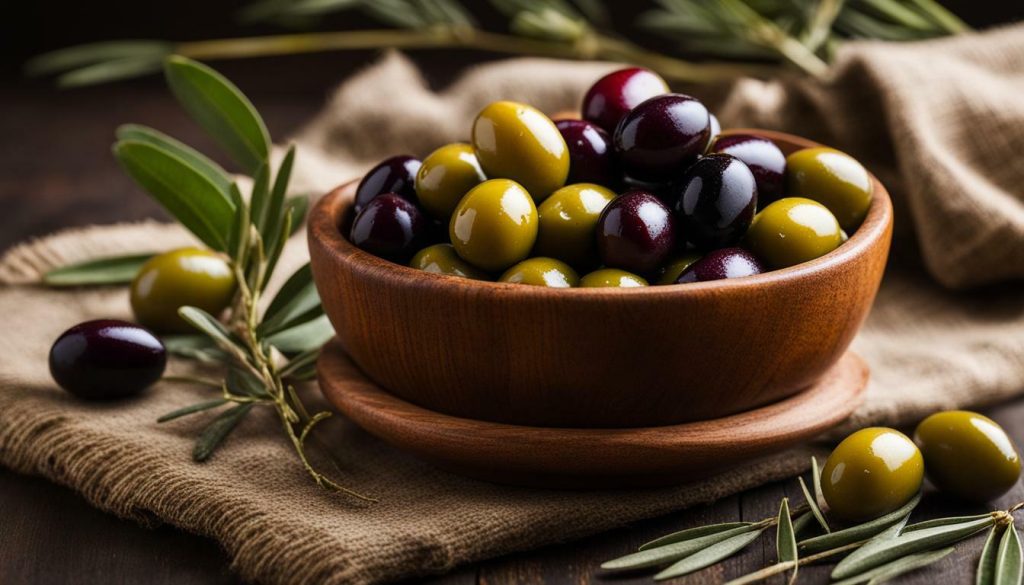
Conclusion
After considering the potential benefits, risks, and guidelines for feeding olives to dogs, it’s clear that olives can be safe for canine consumption when approached with caution and moderation.
While olives are not toxic to dogs, it’s important to remember that they should be given in moderation. Olives that are packed with salt and fat can potentially lead to digestive issues such as gas, diarrhea, and vomiting. To ensure your dog’s safety, it’s best to give them plain olives without pits and without added ingredients like garlic, onions, alcohol, or blue cheese.
Both black olives and green olives are generally safe for dogs to eat, but they do contain high levels of sodium. Therefore, it’s essential to offer them in small amounts as an occasional treat. Olive oil can also be a healthy addition to a dog’s diet, but it’s crucial to use it sparingly, as excessive consumption can lead to pancreatitis.
It’s worth noting that stuffed olives should be avoided. They may contain harmful ingredients like garlic or blue cheese, which can be toxic to dogs. If your dog consumes an olive and appears sick, it’s recommended to seek veterinary advice.
Remember, when introducing new foods to your dog’s diet, it’s important to do so in moderation and consult with a veterinarian if you’re unsure about what foods are safe for your furry friend. By following these guidelines and prioritizing your dog’s well-being, you can safely incorporate olives into their diet as an occasional and enjoyable treat.
FAQ
Can dogs eat olives?
Yes, dogs can eat olives. However, they should be fed in moderation and certain precautions should be taken to ensure their safety.
Are olives toxic to dogs?
No, olives are not toxic to dogs. However, olives packed with salt and fat can lead to digestive issues in dogs.
What digestive issues can olives cause in dogs?
Eating olives packed with salt and fat can cause digestive issues in dogs, such as gas, diarrhea, and vomiting.
What type of olives are safe for dogs?
Both black olives and green olives are safe for dogs. However, they should be given in small amounts due to their high sodium content.
Can dogs eat olives with pits?
No, olives with pits should be avoided as they pose a choking hazard to dogs. It is important to give dogs plain olives without pits.
Can dogs eat olives with added ingredients?
Dogs should only be given plain olives without added ingredients like garlic, onions, alcohol, or blue cheese. These ingredients can be harmful to dogs.
Can dogs eat stuffed olives?
Stuffed olives should be avoided as they may contain harmful ingredients like garlic or blue cheese, which can be toxic to dogs.
Can dogs eat olive oil?
Yes, olive oil can be a healthy addition to a dog’s diet in small amounts. However, excessive consumption can lead to pancreatitis.
What should I do if my dog eats an olive and appears sick?
If your dog eats an olive and appears sick, it is recommended to contact a veterinarian for further guidance.

